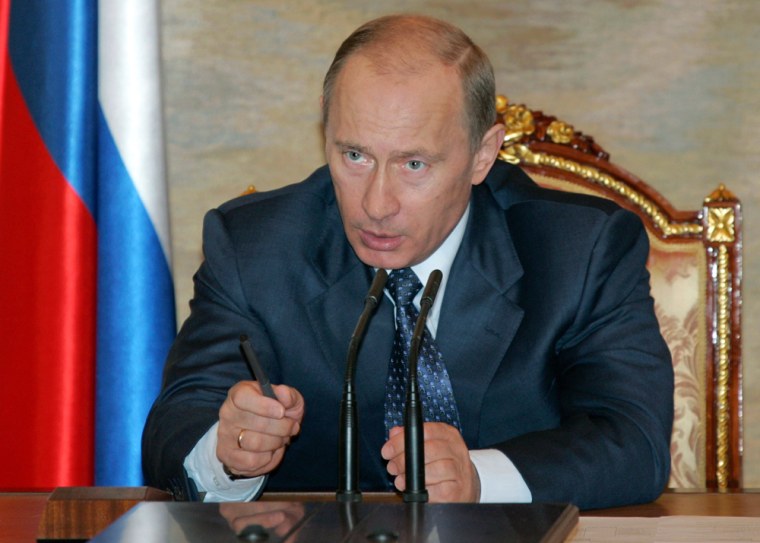Russian President Vladimir Putin said Monday his nation is ready to agree to some of terms laid out in a letter President Bush sent to him ahead of meetings on the U.S. missile defense program. Still, Russia's incoming president predicted intense negotiations to come.
"Six months have passed and we believe that in some of these issues we can probably dot the Is and reach final agreement," Putin said, referring to the last round of U.S.-Russia negotiation on the Bush administration's plans to build a missile defense system in Europe.
Putin called the Bush letter a "very serious document." Pentagon spokesman Geoff Morrell said it outlined what Defense Secretary Robert Gates and Secretary of State Condoleezza Rice wished to talk about during Tuesday's scheduled talks with their counterparts in Moscow.
"If we can reach agreement on its most important provisions than we will be able to state that our dialogue is proceeding successfully. There are still a lot of outstanding problems that need to be discussed," Putin said, sitting across a table from Rice and Gates ahead of their meeting.
Warm tone
The tone of the meeting was warm, in contrast to past Putin sessions where he has been known to set out a Russian hard-line.
Putin's hand-picked successor, President-elect Dmitry Medvedev, also set a positive mood when he met earlier with Gates and Rice, greeting them and smiling often -- a much less imposing figure than Putin, who has moved to consolidate his power and control of Russia in recent years.
Medvedev said Russia still has questions about U.S. missile defense plans but, like Putin, he said he thinks they can be resolved.
"We are determined to go ahead," Medvedev said. "We need to provide for continuity in the Russian-U.S. relationship."
Rice agreed with both Putin and, separately, Medvedev, saying the U.S. and Russia have "a firm foundation for cooperation" on missile defense, which the United States sees as a way to defend against missiles from nations such as Iran and North Korea.
Gates, who had taken a hard line going into the talks, told Medvedev and then Putin that he hoped the two sides can bridge differences.
The Pentagon chief said the U.S. and Russia agree on some issues, and "those where we have disagreements we can see if we can make progress."
Gates, still wearing a sling after fracturing his arm in a fall, joked about his injury as a negotiating tactic.
"With a broken arm, I won't be nearly as difficult a negotiator," Gates told Medvedev
Responded Medvedev in Russian: "We'll see."
En route to Moscow from Washington, Gates said that it is up to the Russians to show they are not pursuing a "sham game" to thwart U.S. efforts to establish missile defense sites in Europe.
He and Rice saw some prospect of progress on long-stalled negotiations over U.S. proposals to establish missile defense sites in central Europe, Gates added with a note of caution.
"I wouldn't get too enthusiastic at this point," he said.
Gates earlier set a tough tone, questioning the sincerity of the Russian government's objections to missile defense.
'A lot on the table'
"My view is we've put a lot on the table" in recent negotiations, Gates said. "Now it's time for them to reciprocate."
Gates and Rice were seeing Putin and Medvedev before daylong talks Tuesday with the Russian defense and foreign ministers.
Gates said he and Rice were bringing no new missile defense proposals to the talks, which will range from cooperation against terrorism, future arms control and economic relations. U.S. officials have said they have "tweaked" previous proposals for cooperation that got a mixed reaction from Moscow.
Gates added: "At some point the Russians are going to have to decide whether they want to be true partners — which we're offering — or whether this is all just a sham game on their part to (stop) the whole deal."
The Bush administration is negotiating with Poland to establish a base there for 10 missile interceptors. They would be linked to a radar site in the Czech Republic, if the Czech government agrees. The system would be part of a wider network of interceptors, radar and communications sites in the United States and elsewhere for defending the country and its allies against long-range missiles.
